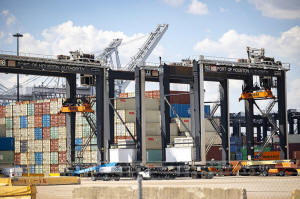US dockworkers threaten to strike against automation, creating economic
uncertainty
 Send a link to a friend
Send a link to a friend
 [January 08, 2025] By
PAUL WISEMAN [January 08, 2025] By
PAUL WISEMAN
WASHINGTON (AP) — Vowing to stop machines from taking their jobs, 45,000
U.S. longshoremen are threatening to go on a strike that would shut down
ports on the East and Gulf coasts and could damage the American economy
just as President-elect Donald Trump returns to the White House.
If the standoff sounds familiar, it’s because the same dockworkers —
members of the International Longshoremen’s Association — staged a
three-day walkout last fall. In October, they suspended the strike until
Jan. 15 after reaching a tentative agreement with ports and shipping
companies for a 62% pay raise over six years. But union members must
approve a final contract before receiving the higher wages.
That’s where things get complicated.
Negotiations resume Tuesday between the ILA and the U.S. Maritime
Alliance, which represents ports and shippers. The sticking point is a
familiar one at America’s ports: machines replacing human labor,
specifically semi-automated cranes operated by software or employees
working remotely to guide containers onto trucks or trains. Conventional
cranes have a human at the controls.
The union and its president, Harold Daggett, are dead set against
allowing additional automation at East and Gulf coast ports. They argue
that the machines aren’t any more efficient than human labor.
“This isn’t about meeting operational needs,’’ Daggett's son Dennis
Daggett, the union’s executive vice president, wrote last month. “It’s
about replacing workers under the guise of progress while maximizing
corporate profits at the expense of good-paying, family-sustaining U.S.
jobs.’’

Port operators and shipping companies argue that U.S. ports are falling
behind more automated ports such as those in Rotterdam, Dubai and
Singapore.
Facing the Jan. 15 strike deadline, the two sides will have barely a
week to reach an agreement. “They’re not giving themselves a whole lot
of time,’’ said Jonathan Gold, a vice president at the National Retail
Federation who handles issues involving supply chains and trade.
Trump has already weighed in for the union. After meeting Harold Daggett
at the Mar-a-Lago club in Palm Beach, Florida, the president-elect
posted on social media that additional automation of ports would hurt
workers: “The amount of money saved is nowhere near the distress, hurt
and harm it causes for American workers, in this case, our
Longshoremen.’’ Trump also asserted that he knows “just about everything
there is to know about’’ automation.
The stakes are high for the U.S. economy. Ports on the East and Gulf
coasts handle more than half the nation’s traffic in shipping
containers, the steel boxes at the center of world trade, which carry
everything from smartphones to fresh fruit to automobiles.
“A strike that lasts less than a week won’t have a material impact on
the broader economy,’’ said Mark Zandi, chief economist at Moody’s
Analytics. “Inventories are generally ample, which will forestall
shortages ... However, a strike that lasts much longer than a week will
cause increasing disruptions and shortages that will result in mounting
economic costs, rising from an estimated $500 million a day to over $2
billion a day if the strike lasts more than a month.’’
[to top of second column] |

Work is completely stopped at the Barbours Cut Container Terminal
during the first day of a dockworkers strike on Tuesday, Oct. 1,
2024, in Houston. (AP Photo/Annie Mulligan, File)
 The retail federation’s Gold says it
take three to five days for supply chains to recover from a one-day
disruption. “If you go anywhere longer than five days, then you’re
into serious difficulties,’’ he said. “Then you’re into weeks of
serious recovery.’’ An 11-day shutdown at West Coast ports in 2002,
he said, “took close to six months to recover from.’’
"A longer strike could hurt retail profitability as there would be
delay in future deliveries, with seasonal and fashion goods arriving
past their peak selling period, resulting in lower sales and an
increase in markdowns to clear these goods,'' said Christina Boni of
Moody's Ratings, a credit agency. The short strike last fall didn't
last long enough to do much damage to the economy and ended before
it could disrupt shipments for the holiday season.
Companies are taking steps to pre-empt potential damage from a
strike. Some are rerouting shipments to the West Coast or to Canada.
The Danish shipping giant Maersk last week urged its customers to
pick up loaded containers from ports before Jan. 15, noting that
“this proactive measure will help mitigate any potential disruptions
at the terminals.’’
Some shippers are hitting their customers with strike-related fees.
The German transportation company Hapag-Lloyd, for instance, has
announced a “work disruption surcharge,’’ effective Jan. 20, of $850
on 20-foot containers and $1,700 on 40-foot containers.
Under their existing contract with the Maritime Alliance, the
top-paid dockworkers earn $39 an hour, or $81,000 a year. The top
hourly wage would rise to more than $60 an hour under the deal
tentatively struck in October.
A 2019-2020 report by the Waterfront Commission, which oversees New
York Harbor, found that a third of the longshoremen based there made
$200,000 or more annually including overtime pay. That did not
include workers’ share of royalties on the cargo that moves through
the ports, payments that can come to thousands of dollars a year.
There’s little consensus on whether automation improves efficiency
at ports – or hurts dockworkers.
IIn 2023, researchers at the Center for Innovation in Transport in
Barcelona, Spain, concluded that “there is no clear evidence
confirming that automated terminals outperform conventional ones’’ —
though they conceded that technological advances could change things
in the future.
All contents © copyright 2024 Associated Press. All rights reserved
 |